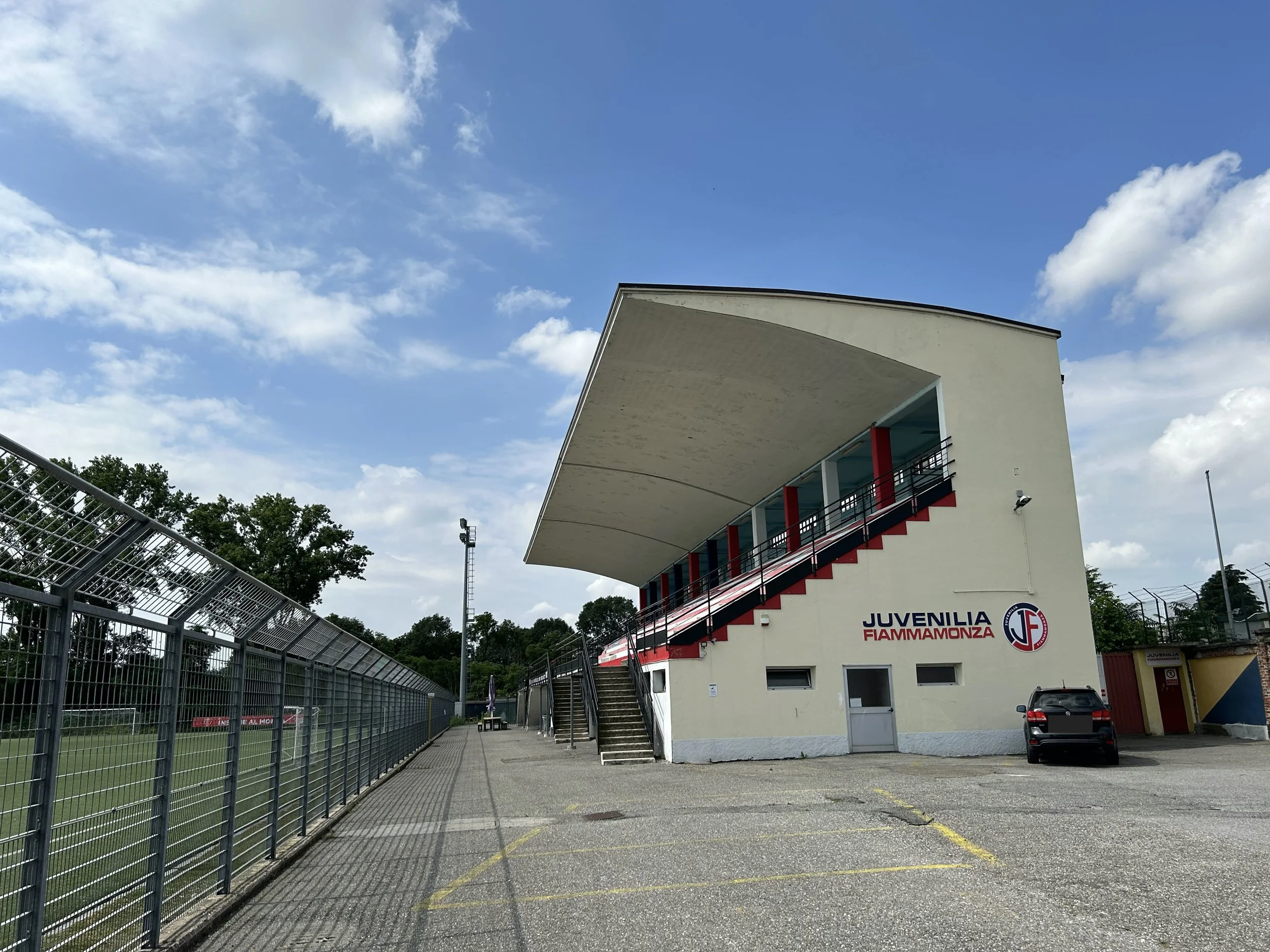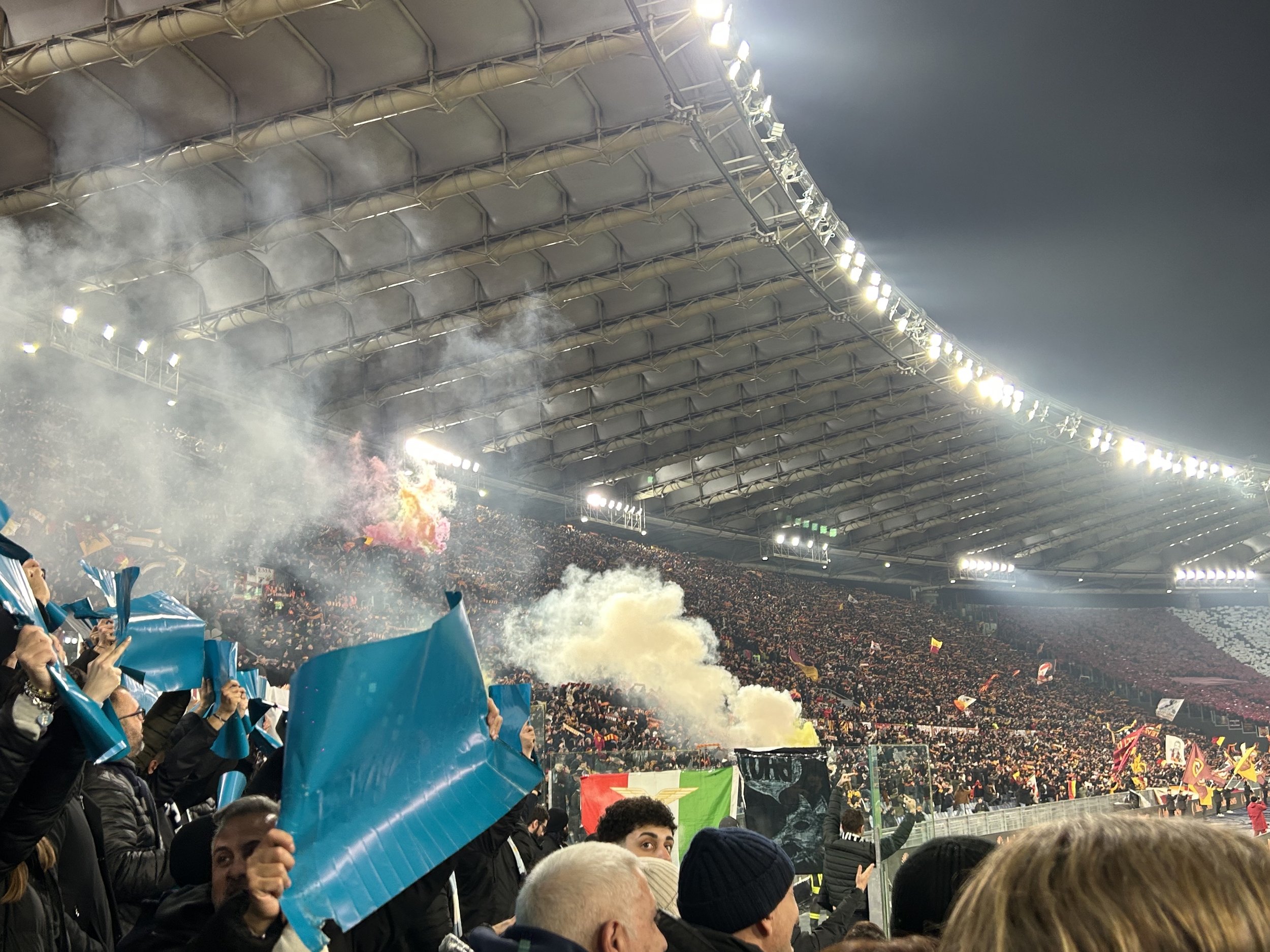The Lion's Den of Padova

Words: Federico Farcomeni
Images: Federico Farcomeni
Nestled in the heart of Padova, Stadio Appiani stands as a poignant reminder of the city’s rich footballing heritage.
Once the pulsating epicenter of local sporting life, the stadium now whispers stories of a bygone era, inviting us to step back in time and relive the moments that made it legendary.
Built in 1924, Stadio Appiani was more than just a sports venue; it was a symbol of community pride and passion. Named after Silvio Appiani, a young and promising player who tragically fell in World War I, the stadium’s very name carries a sense of reverence and loss, setting the stage for the drama and emotion that would unfold on its pitch.
Today, canal circled Prato della Valle is one of the main attractions in the “City of the Saint”, but back then sat on the edge of town. Despite this, the 10th century Abbey of Saint Justina is clearly visible in the background and the St Anthony Basilica is a 15-minute walk away – all this making Stadio Appiani literally embedded in the cultural hotbed of the city.
In its heyday, the Appiani was a cauldron of fervour and excitement, and was nicknamed the Lions’ Den. Every Sunday, thousands of fans would flock to the stadium, their hearts beating in unison with the rhythm of the game.
©Federico Farcomeni/ Terrace Edition. Stadio Appiani. Padova.
The players would catch a glimpse of the amassed crowd from the open tunnel which connected the dressing rooms’ courtyard to the pitch, the air would buzz with anticipation as families, friends, and strangers alike gathered to cheer on their beloved Calcio Padova, most of them neatly dressed in a suit and a tie.
Fans in the East Stand use their umbrellas to pinch linesmen. The roar of the crowd, the scent of freshly cut grass, and the sight of the white shirts of the team created an atmosphere that was nothing short of magical.
Specifically, when compared to the rocky surface in Catania or the just-sown pitch in Trieste, the soft green carpet was one of the distinctive features of the ground.
Just like the wooden roof which is vaguely reminiscent of Fulham’s original Craven Cottage. The field stretched out 23 inches higher than the soil and the drainage system was well ahead of its time.
Nowadays, the principles ensconced at Barcelona and Manchester City forbid academy players to enter the first team pitch as they look at the Camp Nou or the Etihad and dream about their chance one day – the same was true for those Padova youngsters who, just like their older counterparts and the professional cyclists, used to train at next door Stadio Monti (a proper velodrome) and would not even dare to get close to the Appiani as legendary coach Nereo Rocco would bark at them.
©Federico Farcomeni/ Terrace Edition. Stadio Appiani. Padova.
Still, they shared the courtyard with the first team players, hearing how it felt like to play for Padova one day. Monti was the “anteroom” of the Appiani. One day, as Inter came to town, legendary striker Valentín Angelillo (one of the infamous angels with dirty faces) asked who were the ballboys training next door – turned out the “ballboys” won the game 2-0 in the end.
A Padova side led by Manchester City and Manchester United former player Herbert Burgess, opened the ground with a resounding 6-1 victory against Andrea Doria. The 1940s and 1950s were particularly golden years for Stadio Appiani. It was during this period that Calcio Padova reached the zenith of its glory, competing in Italy’s top division and challenging some of the biggest names in football. The Great Torino of those years left the stadium with a spectacular 4-4 draw, whilst Juventus (3-0) and AC Milan (5-2) would both suffer heavy defeats.
In 1958, Padova finished third just behind Juventus and European Cup finalists Fiorentina. Big teams would sleep at the Monaco hotel and the following morning, waiters would tell Padova players about their opponents’ pre-match routine, who ate what and how they slept.
In 1967, Serie B-side Padova lost the cup final in Rome against AC Milan after prevailing over Inter in the semifinals, winning 3-2 at home. Legendary players, such as Amedeo Amadei and Sergio Brighenti, graced its field, their exploits etched into the annals of local folklore.
Later on, World Champion Alessandro Del Piero, European Champions Angelo Di Livio and Demetrio Albertini and USA sensation Alexi Lalas would join the list. In 1977, the All Blacks just beat an Italian rugby All-Star XV by a small margin (15-9). In the 1980s, the club would bring the stadium to a 24,000 capacity even if 25,346 were crammed into the ground for a cup match against newly-promoted AC Milan in 1983.
©Federico Farcomeni/ Terrace Edition. Stadio Appiani. Padova.
Uruguay would beat Padova 4-1 in a pre-Italia 90 friendly, whilst Real Madrid would beat the Biancoscudati 2-0 the following summer. The stalemate against Palermo on 29 May 1994 wished Padova well as they were eventually promoted back to Serie A after a 32-year wait.
The leap coincided with the grand opening of the athletic-tracked Stadio Euganeo as a star-studded Parma side strolled in the new ground winning 3-0 on the first day of the new season as Tino Asprilla struck twice.
The rise of modern, larger stadiums and the relentless march of progress led to its gradual decline, especially as the local council was particularly fed up with road closures on match days.
Today, Stadio Appiani stands as a quiet, contemplative space, its empty stands and overgrown grass a stark contrast to its former glory. But for those who pause to listen, the echoes of the past still resonate within its walls.
©Federico Farcomeni/ Terrace Edition. Stadio Appiani. Padova.
The memories of thrilling matches, of shared joys and sorrows, of a community united by its love for the game, linger in the air, refusing to be forgotten.
Walking through Stadio Appiani now, one can’t help but feel a sense of nostalgia and reverence. It is a place where the past feels almost tangible, where the spirit of football lives on in the collective memory of those who witnessed its finest hours.
Stadio Appiani may no longer host the grand spectacles of yesteryears, but its legacy endures, a testament to the timeless bond between a city and its cherished stadium. In Padova, Stadio Appiani remains a sacred site, a monument to the enduring power of sport to bring people together, to inspire dreams, and to create memories that last a lifetime.
Meanwhile, at the “cold” Stadio Euganeo, the club have now managed to build a new stand finally closer to the pitch – in the hope of bringing back the glory days of the Lions’ Den.
©Federico Farcomeni/ Terrace Edition. Stadio Appiani. Padova.
©Federico Farcomeni/ Terrace Edition. Stadio Appiani. Padova.
©Federico Farcomeni/ Terrace Edition. Stadio Appiani. Padova.
©Federico Farcomeni/ Terrace Edition. Stadio Appiani. Padova.
©Federico Farcomeni/ Terrace Edition. Stadio Appiani. Padova.
©Federico Farcomeni/ Terrace Edition. Stadio Appiani. Padova.
©Federico Farcomeni/ Terrace Edition. Stadio Appiani. Padova.
©Federico Farcomeni/ Terrace Edition. Stadio Appiani. Padova.
©Federico Farcomeni/ Terrace Edition. Padova.
Federico is on X: ©fedefarco
Calcio Padova are on X: @padovacalcio.
Their website is: https://www.padovacalcio.it


















